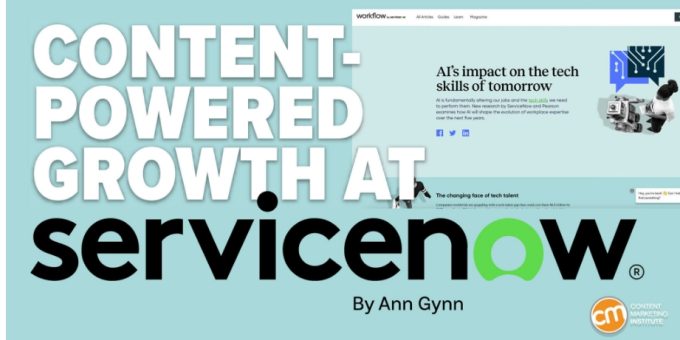
They didn’t initially need thought leadership. They needed great products and sales.
ServiceNow had that — a cloud-based workflow platform used to automate various IT processes. But ServiceNow lacked a strong brand identity, says Richard Murphy, who joined the company as the editor-in-chief and director in 2017. ServiceNow had 5,500 employees and posted $1.9 billion in revenue that year.
“We weren’t particularly well known outside of IT customers, and our core customer was a director of IT sitting deep in the IT function,” Richard says.
ServiceNow’s presence in the marketplace has changed rapidly since Richard joined the company. It expanded its products and services and adopted a comprehensive content marketing strategy to support that growing and diverse audience. Today, ServiceNow provides an AI-powered platform that automates processes across nearly every enterprise function, from IT to human resources, customer service, finance, procurement, and beyond. In 2023, ServiceNow boasted more than 22,000 employees and $8.5 billion in revenue, and it’s on the way to $16 billion in the not-too-distant future, Richard says.
Its content strategy worked well for the company and led to marketing industry accolades. ServiceNow and its agency partner Message Lab took top honors at the 2023 Content Marketing Awards for Best Content Marketing Program, Agency/Client Content Marketing Partnership, B2B Publication, and Best Digital Publication (distribution). It also was a finalist in eight other categories.
Richard was named 2023 B2B Content Marketer of the Year.
Using content as a growth strategy
How did a business journalist and social scientist develop a content marketing strategy that supported and contributed to the rapid expansion of ServiceNow?
Richard turned to thought leadership. But he didn’t produce those run-of-the-mill white papers, e-books, and webinars. Instead, he adopted a Harvard Business Review mentality and launched Workflow, a digital publication that covers emerging trends in enterprise tech and business strategy. Workflow has been a cornerstone of ServiceNow’s strategy to position itself as a strategic innovation partner to businesses and governments worldwide. The content brand now includes Workflow Quarterly, a magazine that covers a singular theme each quarter, from the digital experience to ESG (environmental, social, and governance) to risk management.
Workflow Quarterly offers a premium editorial experience, packaging proprietary research and deeply reported stories in a compelling format. The result is a magazine that entices readers and educates them about digital transformation.
When ServiceNow’s thought leadership program started, some inside ServiceNow wondered why the brand should invest in building thought leadership. Richard needed to convince them it would move the bottom line.
“Nobody ever got in my face and said, ‘Richard, your work has no value. Why are you here?’” he says. “Everybody was willing to give me a chance, but I wouldn’t say that my job security was super awesome for the first couple of years.”
It helped that ServiceNow was growing its product lines and expanding its target audiences. Until 2017, the audience was made up of IT directors seeking to lower their costs. However, the expansion in product lines and industries meant the buyer profile evolved into people with C-level titles. Eighty percent of the Fortune 500 are ServiceNow customers, along with government agencies around the world.
These decision-makers are senior leaders who may or may not have technical backgrounds. “They’re much less interested in the ins and outs of tech — the speeds and feeds of tech — than they are in the strategic value of tech,” Richard explains.
Senior leaders want to know the answers to these questions if they invest in ServiceNow’s technology for their IT operations, HR services, customer service management, procurement, finance, etc.:
- How much money will I save?
- How will it improve labor productivity?
- What’s it going to do for employee and customer satisfaction scores?
Read more at Content Marketing Institute








